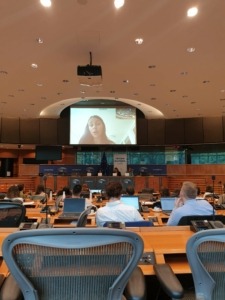Today, 15 September 2022, MEP Irena Joveva sent an open letter to the CEOs of digital platforms Amazon Prime, Disney+ and Netflix, urging them to make their services and content available in Slovene. European citizens deserve the right to use content in their mother tongue, regardless of the prevalence of a particular language, she wrote.
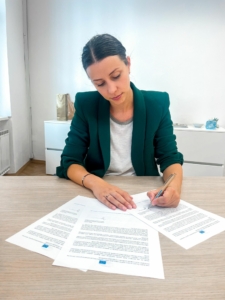 In her letter, she expressed her concern and disappointment with the situation, explaining that such practices are discriminatory and that multilingualism, both in the European Union and more broadly, is a value of which we can be proud and which should be promoted.
In her letter, she expressed her concern and disappointment with the situation, explaining that such practices are discriminatory and that multilingualism, both in the European Union and more broadly, is a value of which we can be proud and which should be promoted.
Special attention should be paid to less-spoken languages, highlighted Joveva in her letter, referring to the provisions of the EU Charter of Fundamental Rights, the EU Treaty and Directive 2010/13/EU (Audiovisual Media Services Directive).
She said the content offered by these companies also plays an important role in the education, socialisation and upbringing of children who are not yet proficient in foreign languages. The content is also less accessible to all those who do not understand foreign languages.
The European Union recognises the existence of a multilingual digital single market where everyone deserves equal treatment with equal accessibility regardless of their location and start of provision of a digital service, therefore Joveva called on the CEOs of these companies to consider making all official EU languages equally accessible on online streaming media platforms.
The MEP also points out that although Slovenian legislation, specifically Article 20(2) of the Public Use of the Slovene Language Act, should be sufficient, problems arise due to the fact that the said digital platforms are not registered in Slovenia. Therefore, in her opinion, the Audiovisual Media Services Directive should be urgently transposed into national legislation, which would enable the introduction of precise requirements for such translations and to remedy the existing shortcomings.
“Let me remind you that we, as members of the European Parliament, like to say that we are united in diversity, and I firmly believe that this is something that we should very much promote, something that every European should fight for and, above all, something that every company operating in the single European market should respect. It is not so much a question of whether or not there is a legal basis requiring the use all European languages. It is about the right of each and every individual, and about the fact that it is our diversity and all of the beautiful European languages that shape our European mosaic. Let us give all Europeans the dignity and respect they deserve – in their mother tongue.”
The MEP sent the letter to the CEOs of the companies in question in Slovene. You can read it in full below:
Letter regarding the (non-)use of the Slovene language on your digital platforms in Slovenia (available only in Slovenian language)

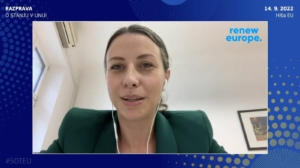 According to Joveva, what we have been hearing much too often are merely wishes and ideas on how the Western Balkans should become a part of the EU. She believes that the Commission President is right to touch on the Western Balkans in her annual State of the Union address, but she is also convinced that without shifts in the EU’s decision-making system, no progress can be achieved. She criticised the system of consensus required in the Council, where some Member State leaders often pursue narrow vested interests, while the European Parliament and the European Commission have no competence to decide on the progress of the Western Balkan countries towards EU accession.
According to Joveva, what we have been hearing much too often are merely wishes and ideas on how the Western Balkans should become a part of the EU. She believes that the Commission President is right to touch on the Western Balkans in her annual State of the Union address, but she is also convinced that without shifts in the EU’s decision-making system, no progress can be achieved. She criticised the system of consensus required in the Council, where some Member State leaders often pursue narrow vested interests, while the European Parliament and the European Commission have no competence to decide on the progress of the Western Balkan countries towards EU accession.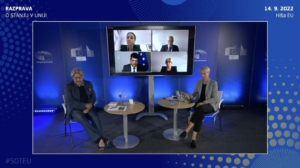 Nevertheless, Joveva praised the Commission President for highlighting in her speech the area of mental health, which does not receive attention it ought to. She expressed her satisfaction that the report on the impact of COVID-19 closures of educational, cultural, youth and sports activities on children and young people in the EU was expected to be adopted during this week’s plenary session, to which she contributed as a rapporteur on behalf of the Renew Europe group.
Nevertheless, Joveva praised the Commission President for highlighting in her speech the area of mental health, which does not receive attention it ought to. She expressed her satisfaction that the report on the impact of COVID-19 closures of educational, cultural, youth and sports activities on children and young people in the EU was expected to be adopted during this week’s plenary session, to which she contributed as a rapporteur on behalf of the Renew Europe group.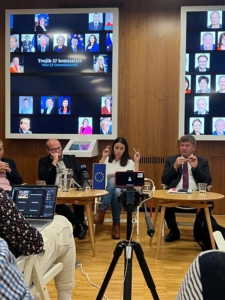 On the decoupling of gas from electricity, the MEP stressed that the electricity market must be designed in such a way that cheaper forms of energy production can continue to invest in cleaner production methods that are also in line with the Green Deal, and that she expects more understanding from the Council and the Member States in this regard. She underscored that the environmental crisis must not be neglected either.
On the decoupling of gas from electricity, the MEP stressed that the electricity market must be designed in such a way that cheaper forms of energy production can continue to invest in cleaner production methods that are also in line with the Green Deal, and that she expects more understanding from the Council and the Member States in this regard. She underscored that the environmental crisis must not be neglected either.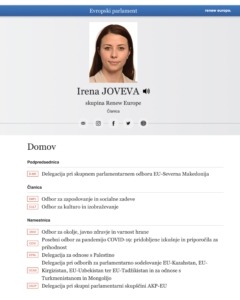 So far, I have been a substitute member of this committee, as I continue to be of the Committee on the Environment, Public Health and Food Safety, and have “only” been a full member of the Committee on Culture and Education. It is not often the case that an MEP gets full membership (with voting rights) of two committees, therefore I consider it a great honour and I trust that this, too, is a testament to my work so far.
So far, I have been a substitute member of this committee, as I continue to be of the Committee on the Environment, Public Health and Food Safety, and have “only” been a full member of the Committee on Culture and Education. It is not often the case that an MEP gets full membership (with voting rights) of two committees, therefore I consider it a great honour and I trust that this, too, is a testament to my work so far. As rapporteur on behalf of Renew Europe for the European Solidarity Corps, Ms Joveva presented a few details about this programme, for which a separate budget line has been foreseen for the first time and much more funding envisaged than in previous years. The European Solidarity Corps allows young Europeans to volunteer or participate in projects in an EU Member State or a partner country. She called for a greater promotion of the high-quality and diverse programme that shows that the European Parliament appreciates volunteering and wishes to ensure that it is as inclusive and accessible as possible for those in need.
As rapporteur on behalf of Renew Europe for the European Solidarity Corps, Ms Joveva presented a few details about this programme, for which a separate budget line has been foreseen for the first time and much more funding envisaged than in previous years. The European Solidarity Corps allows young Europeans to volunteer or participate in projects in an EU Member State or a partner country. She called for a greater promotion of the high-quality and diverse programme that shows that the European Parliament appreciates volunteering and wishes to ensure that it is as inclusive and accessible as possible for those in need.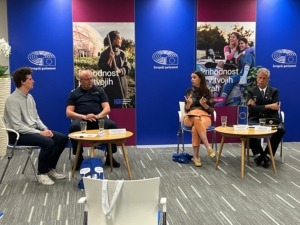 Finally, Joveva expressed her wish that volunteering should not be taken for granted, which might be happening under the influence of the growing individualism in society.
Finally, Joveva expressed her wish that volunteering should not be taken for granted, which might be happening under the influence of the growing individualism in society.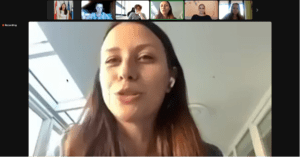 During the discussion, some young people pointed out that a lot of new equipment has been purchased for distance learning, which schools and universities could also use in the future. Joveva agreed, believing that the benefits of the technological advances made during the epidemic should be preserved to the greatest extent possible. She mentioned the example of electronic voting introduced in the European Parliament, which has made it possible to better monitor the votes cast by MEPs, making voting fully transparent. In her view, this allows for a more democratic and fairer approach.
During the discussion, some young people pointed out that a lot of new equipment has been purchased for distance learning, which schools and universities could also use in the future. Joveva agreed, believing that the benefits of the technological advances made during the epidemic should be preserved to the greatest extent possible. She mentioned the example of electronic voting introduced in the European Parliament, which has made it possible to better monitor the votes cast by MEPs, making voting fully transparent. In her view, this allows for a more democratic and fairer approach.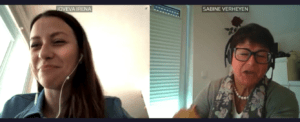
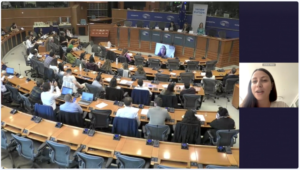 Joveva maintained that as long as mental health is stigmatised to such an extent, young people will not dare to seek help, which will inevitably lead to an even greater increase in mental distress. She believes that overcoming stigma requires education and providing people with the right information. This should start with mainstreaming mental health into school systems, while a frank conversation about mental health must continue with all members of our society (peers, parents, doctors, teachers, influencers, etc.).
Joveva maintained that as long as mental health is stigmatised to such an extent, young people will not dare to seek help, which will inevitably lead to an even greater increase in mental distress. She believes that overcoming stigma requires education and providing people with the right information. This should start with mainstreaming mental health into school systems, while a frank conversation about mental health must continue with all members of our society (peers, parents, doctors, teachers, influencers, etc.).